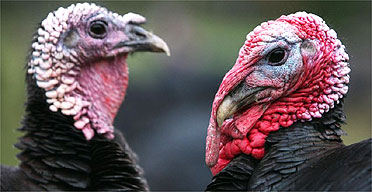
Health experts monitoring an outbreak of bird flu in Suffolk were today checking whether a farm worker had contracted the disease.
The Health Protection Agency said the worker had been employed at the Bernard Matthews poultry unit in Holton, where bird flu was confirmed on Thursday.
Officials said the worker was undergoing hospital tests for the H5N1 virus.
It is the second time in two days that doctors have tested people working at the farm. Earlier today, the HPA said a vet had tested negative for the virus after complaining of a mild respiratory illness.
Officials said the worker being tested had complained of respiratory problems and test results should be available tomorrow. An HBA spokesman said the tests were a precaution and no one working at the farm was expected to test positive for avian flu.
But he said it was likely that a number of people would report respiratory problems in the coming weeks and they would have to be tested to ensure they had not picked up the virus.
"This is the time of year when we see an increase in these infections and we will carry out tests as a precaution," the spokesman said.
Experts were today continuing to clean and disinfect the huts where the infected turkeys were housed.
Nearly 160,000 turkeys at the farm were culled as a precaution following the outbreak.
Department for Environment, Food and Rural Affairs officials said they expected the disinfecting operation to be completed tomorrow.
British health officials told the rest of Europe yesterday they did not believe there was a link between the outbreak of bird flu at the Bernard Matthews farm and two recent cases in Hungary, where Mr Matthews also has poultry interests.
Reporting in Brussels to the EU's standing committee on the food chain and animal health, experts from the Department for Environment, Food and Rural Affairs said that after culling 159,000 birds they were still trying to trace the source of the outbreak.
Michael Mann, a European commission spokesman, said the British officials had told the meeting it was "not likely" that the bird flu had come from Hungary. Earlier, a senior EU health official had said there was "obviously" a link between the British and Hungarian cases, since the H5N1 strain of the virus was virtually identical in both countries. The British and Hungarian outbreaks, the first in Europe for more than six months, had also occurred within days of one another.
With the quest to locate the source of the Suffolk outbreak acquiring urgency, officials in Brussels said no wild birds had been discovered bearing the virus, despite widespread monitoring, and there was no case for bans on imports of British poultry. It offered EU funding for "market support measures" in support of the British poultry industry, which is the second biggest in the EU.

